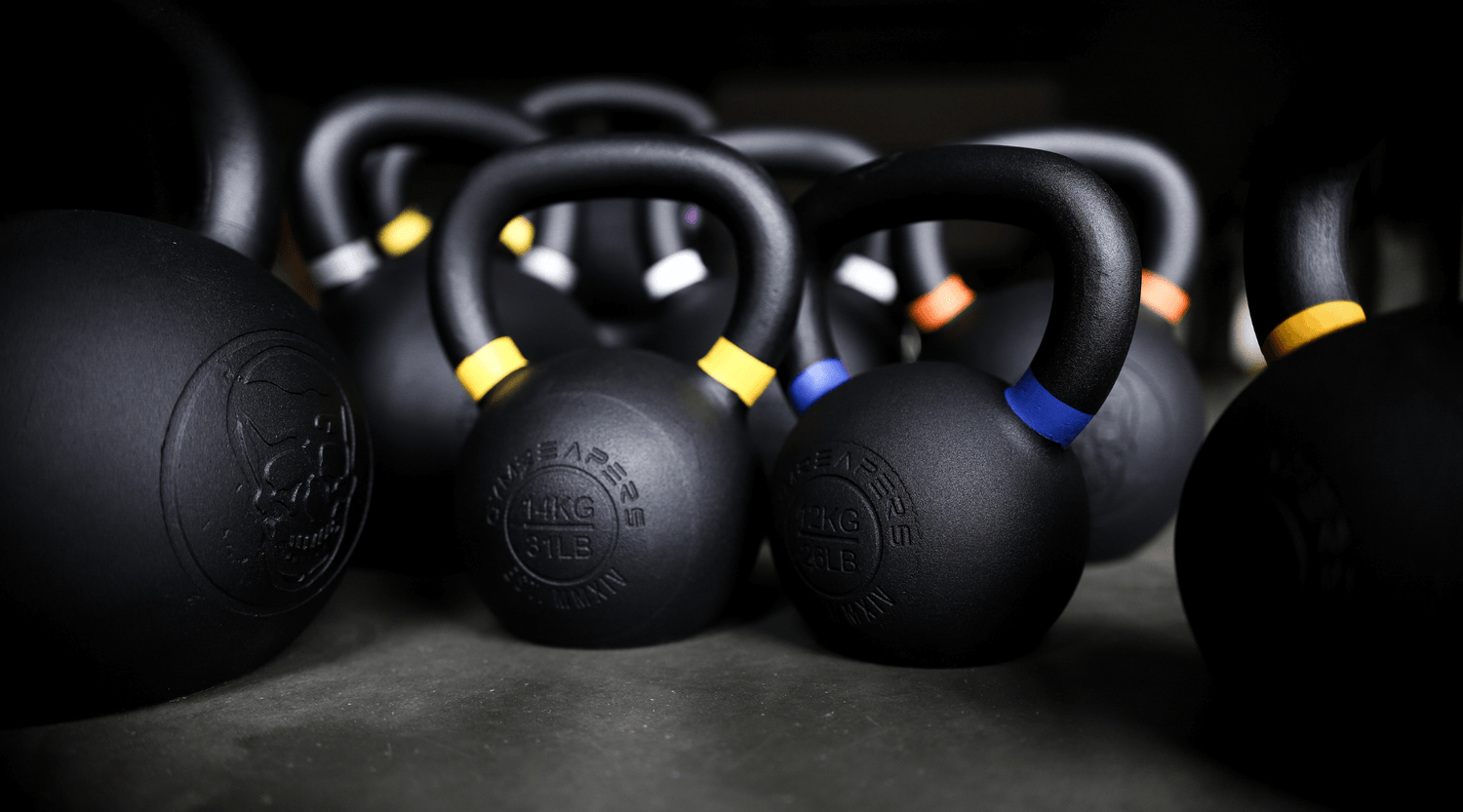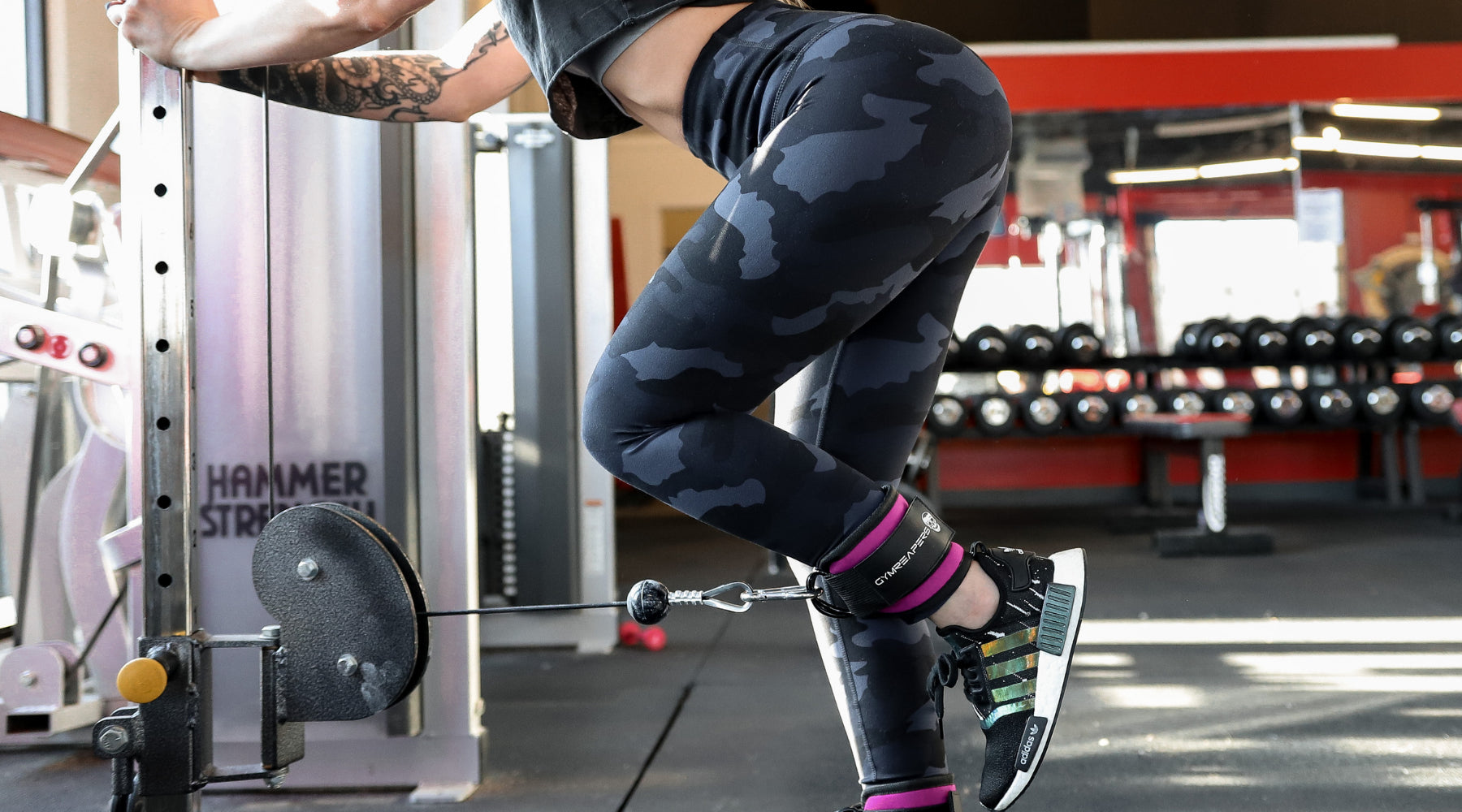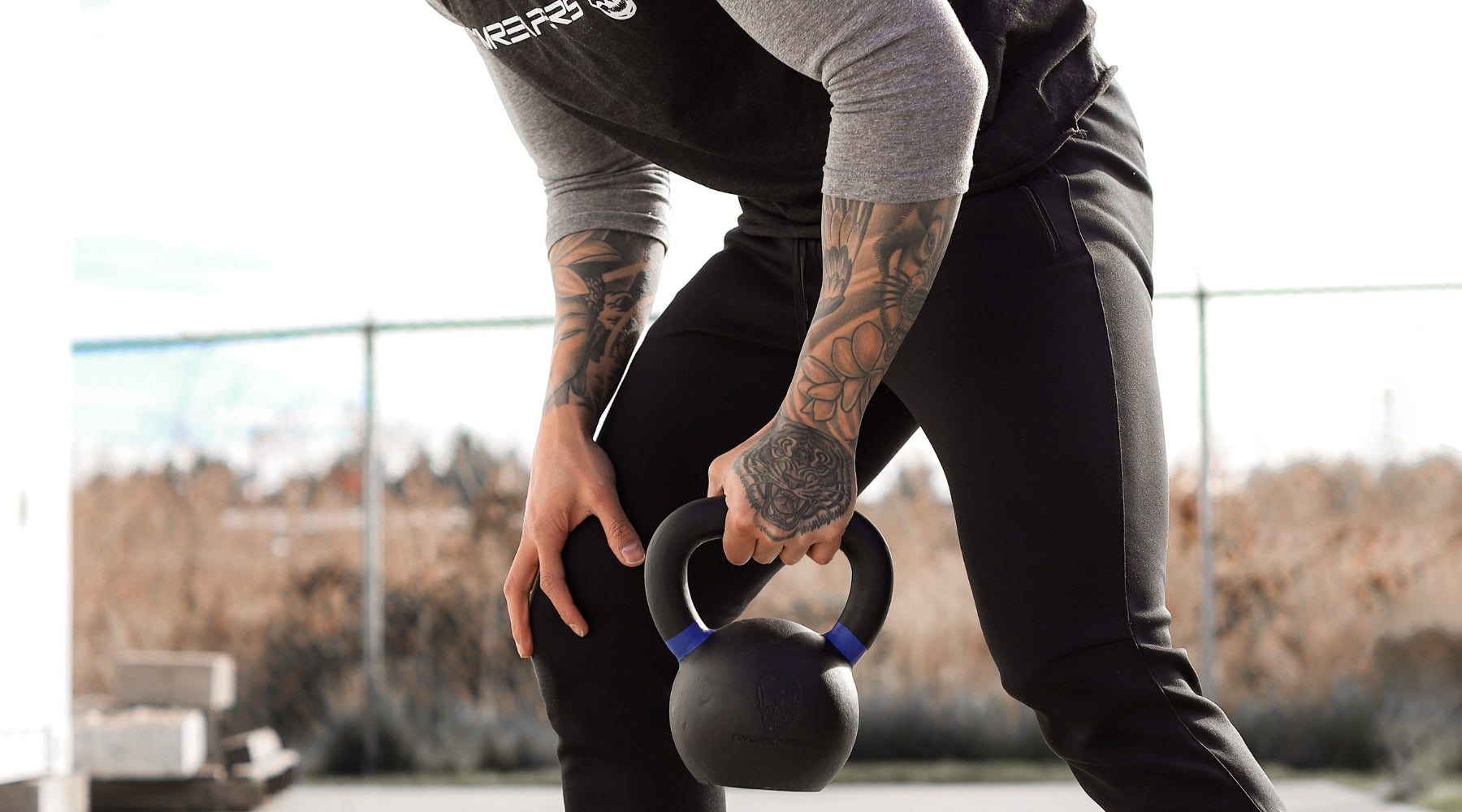Have you ever walked by a rack of kettlebells at your gym and wondered if you should incorporate them into your workout? Kettlebells can be intimidating as they’ve typically been used in competitions.
That perception is changing as kettlebells are becoming more popular at gyms, backyards, and garages throughout the world.
Why is there such an appeal to using kettlebells for training? One of the biggest benefits of kettlebells is they’re portable and don’t take up a lot of space. Another reason is that a kettlebell workout can burn 400 calories in 20 minutes, producing results quickly (1).
Kettlebells are versatile, affordable, and provide a full-body workout.
If you’ve been wondering about owning your own kettlebells, then you came to the right place. Aside from the obvious benefits that we shared above, it’s important to know the proper ways to use kettlebells for your next kettlebell exercise. Here’s everything you need to know about kettlebells.

What is a kettlebell?
That question may sound absurd to some, but it’s important to establish the groundwork. An authentic kettlebell is made from cast-iron or steel. The kettlebell shape resembles a cannonball with an attached handle. Visually, some have compared it to a teapot without the spout — referred to as a kettlebell.
The kettlebell first gained recognition around 350 years ago when Russians started throwing them around for entertainment, and later used for weightlifting. Although there is also a claim that ancient Greeks first developed such objects in the fifth century. Either way, kettlebells are extremely effective in burning calories and can be used to build endurance in the lower and upper body.
There are many size variations of kettlebells and they range from 4 pounds all the way to 175 pounds. Most kettlebells are labeled in kilograms (kg), so pay attention to the weight before begging your workout.
One of the biggest reasons kettlebells are so effective is because of their structure, often feeling heavier than a traditional dumbbell due to their center of gravity. This is why kettlebells are effective in improving strength and balance. In addition, kettlebells can be an alternative to running since they activate muscles that are responsible for respiratory activity.

How to use kettlebells
Before you get started with implementing kettlebells in your workouts, it’s important to note that proper form is very important — just like with any other exercise. Now let’s break it down and get started.
It all starts with choosing the right weight of kettlebell. Start by evaluating your exercise routine and fitness level first. Next, outline how many repetitions you want to perform.
Depending on your fitness level, a beginner would typically start at 9 pounds (4kg), where an expert might begin with 18 pounds (8kg). Test and decide which is best for you. Males typically start with 13 pounds (6kg) all the way up to 26 pounds (12kg).
Injury prevention is critical. You can avoid getting hurt and prevent injuries by starting with a strong foundation. This means having your feet planted securely (shoulder-width apart) with the weight distributed to your heels.
In the most common exercise — the kettlebell swing — start by picking up the kettlebell off the ground, making sure you have a slight bend in the knees.
Check your back and core and make sure that there is no weakness in either. A slouched posture is a recipe for injury and disaster. The biggest reason to have a firm posture is that the driving force behind the kettlebell should come from your hips and legs, not arms.
Never swing or place the kettlebell directly over your head. Using the momentum from your lower body, with your arms straight out holding the kettlebell, swing so that the kettlebell meets the level of your head, without going over your head.
Swing back down to almost ground level to your starting position. This completes one repetition of the kettlebell swing. You can repeat the process as many times as needed, with the biggest takeaway being to have a strong core and foundation.
Benefits of kettlebells
Why should you train with kettlebells? The benefits of kettlebell training are almost endless. One of the most significant advantages of using kettlebells is power endurance. That’s different from most of the typical workouts that focus on strength endurance, and not power endurance.
Power endurance involves moves that are performed quickly such as the snatch and the clean and jerk. These exercises force you to perform moves quickly and activate muscular contractions rapidly, giving you more power and a bigger calorie burn (2).
So, what are the top benefits of kettlebells? We’ve picked our top five favorite benefits of kettlebells. Here’s what makes kettlebells so great:
1) Kettlebells give you a stronger grip and more powerful forearms
Due to the thicker handle (thicker than a dumbbell or barbell), a kettlebell improves grip strength. By maneuvering a kettlebell, its center of gravity moves with your grip and give you more dynamic muscle contractions.
2) Kettlebells don’t require a large training space
Because you can do so much with a few kettlebells, you eliminate the need to train at a big facility regularly. More and more home gyms and smaller training spaces keep appearing, making kettlebells ideal equipment for storing and saving space.
3) Kettlebells reduce your overall workout time
Most of us live fast-paced lives and don’t have two or three hours a day for a killer workout. Using kettlebells for an effective full-body workout in 20 minutes gives you more freedom in your day.
4) Kettlebells provide a workout anywhere, anytime
Due to their storage convenience and because they take up so little space, kettlebells can be used virtually anywhere. They’re portable and can deliver quick workouts no matter where you train.
5) Kettlebells help you get cardio
Kettlebell workouts are so dynamic and require the use of various muscle groups. As you work through the different moves, your heart rate elevates, giving you built-in cardio.

What do kettlebells help with?
The list of usefulness and effectiveness of kettlebells continues. No matter what type of athlete you are, you can benefit from using kettlebells. Even runners see benefits of kettlebells because it helps with form and posture.
So what do kettlebells actually do? Here are some of the areas in your fitness life where kettlebells have such a big impact on:
1) Improve your strength and power
Kettlebell workouts force you to utilize the movement of your hips and glutes. Performing kettlebell swings, for example, improves your stability and engages the glutes, giving you strength and power.
2) Improve your core strength and stability
An amazing benefit of kettlebell workouts is that it engages your core muscles. When performing a goblet squat, for example, having a firm core improves your overall form while strengthening the muscles.
3) Shape up your body posture
Because there is so much focus on keeping your body stable and your core firm, you naturally gravitate towards a better posture. As we pointed out, slouching during any exercise may result in injury. It’s a mistake you’ll avoid if you have the correct posture.
4) Running with the right form
For avid runners, it’s especially important to run correctly. Tight hip flexors can cause issues with stride with and overall endurance. Performing kettlebell exercises that target your glutes and hips prevents the power burnout.
5) A bigger range of motion
Kettlebells can be used in a variety of ways to help you improve your range of motion. If you’re having trouble with your squat form, holding a kettlebell in a goblet squat position will activate the muscles you need to push your boundaries.
The bottom line
Whether you’ve been browsing for a kettlebell (or two) of your own, there are many benefits of owning your own, as well as incorporating kettlebells in your workout program.
Explosive workouts help burn more calories and can improve your stability and strength. The greatest thing about kettlebells is that they’re versatile, affordable, and provide a full-body workout.
No matter your fitness level, there is a kettlebell size for you. Ranging from 4 kg up to 44 kgkg, the cast iron kettlebells from Gymreapers make a great addition to your routine.
References
- (COVID-19), C., Health, E., Disease, H., Disease, L., Management, P., & Conditions, S. et al. (2021). Kettlebell Workouts: What to Know Before You Start. Retrieved 8 June 2020, from https://www.webmd.com/fitness-exercise/guide/kettlebell-workout#1
- Randall, T. (2019). Training Series: Power Endurance | Lattice Training. Retrieved 8 June 2020, from https://latticetraining.com/2019/01/14/training-series-power-endurance/#:~:text=1.,them%20through%20intermittent%20muscle%20contraction











Hinterlasse einen Kommentar
Alle Kommentare werden vor der Veröffentlichung geprüft.
Diese Website ist durch hCaptcha geschützt und es gelten die allgemeinen Geschäftsbedingungen und Datenschutzbestimmungen von hCaptcha.